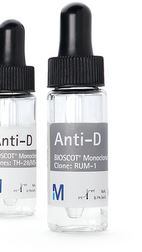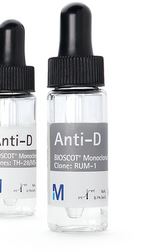BLOOD GROUPING TEST, RHESUS anti D (BIOSCOT), 10ml, dr.bot
Valid Article
BLOOD GROUPING TEST, RHESUS anti D (BIOSCOT)
Definition
Reagents containing immunoglobulines used in the blood rhesus typing. The immunoglobulins capable of binding to specific antigenic determinants. This reagent is intended to be used in testing a clinical specimen for Rh(D) red blood cell antigens from the rhesus system, using an agglutination method (clumping).
Used together with the anti-A, anti-B, anti-AB and Rhesus negative blood grouping reagents.
Specifications
Components
- Murine monoclonal antibodies, chemical potentiators and bovine material
- Preservative agent: 0.1% (w/v) sodium azide
Technical specifications
- Colorless, limpid reagent
- Labelised dropper bottles
- IgM monoclonal antibody; clone RUM-1
Packaging & Labelling
10 x 10 ml dropper bottles, intended for about 150 - 200 tests
Instructions for use
Follow the instructions in the leaflet.
Perform the agglutination test on an opaline plate or a porcelain tile, or in default of this, on a slide.
Most examples of D weak and partial D red cells are detected.
Storage
- Keep refrigerated between 2 and 8ºC
- Do not freeze
- Shelf life: 36 months
- Not to be used beyond expiry date
- Close the bottle tightly after each use to prevent bacterial contaminations (causing the deterioration of the serum-test). In case of doubt concerning the serum-test validity, perform a check on a known blood, fresh or kept in good conditions (2 - 8ºC).
MSF requirements
The 5 reagents for blood grouping (anti-AB, anti-A, anti-B, anti Rh D, Rhesus negative control) must all come from the same manufacturer. This is the reason why we close the article to 1 manufacturer.





![[ELABTILE1--] TILE, blood grouping, white and smooth](/web/image/product.template/571039/image_256/%5BELABTILE1--%5D%20TILE%2C%20blood%20grouping%2C%20white%20and%20smooth?unique=deb8c56)
![[SSDTBLOC1--] BEDSIDE CONTROL CARD, ABO compatibility (Serafol)](/web/image/product.template/568722/image_256/%5BSSDTBLOC1--%5D%20BEDSIDE%20CONTROL%20CARD%2C%20ABO%20compatibility%20%28Serafol%29?unique=3717dba)
![[SSDTBLOG3A-] BLOOD GROUPING TEST, anti A (BIOSCOT), 10 ml, dropper bot.](/web/image/product.template/568661/image_256/%5BSSDTBLOG3A-%5D%20BLOOD%20GROUPING%20TEST%2C%20anti%20A%20%28BIOSCOT%29%2C%2010%20ml%2C%20dropper%20bot.?unique=d8cbb93)
![[SSDTBLOG3AB] BLOOD GROUPING TEST, anti AB (BIOSCOT), 10ml, dropper bot.](/web/image/product.template/568689/image_256/%5BSSDTBLOG3AB%5D%20BLOOD%20GROUPING%20TEST%2C%20anti%20AB%20%28BIOSCOT%29%2C%2010ml%2C%20dropper%20bot.?unique=357ca40)
![[SSDTBLOG3B-] BLOOD GROUPING TEST, anti B (BIOSCOT), 10 ml, dropper bot.](/web/image/product.template/568692/image_256/%5BSSDTBLOG3B-%5D%20BLOOD%20GROUPING%20TEST%2C%20anti%20B%20%28BIOSCOT%29%2C%2010%20ml%2C%20dropper%20bot.?unique=357ca40)
![[SSDTBLOG3C-] RH NEGATIVE CONTROL,monocl. antibodies (BIOSCOT), 10ml,bot](/web/image/product.template/568690/image_256/%5BSSDTBLOG3C-%5D%20RH%20NEGATIVE%20CONTROL%2Cmonocl.%20antibodies%20%28BIOSCOT%29%2C%2010ml%2Cbot?unique=716e046)